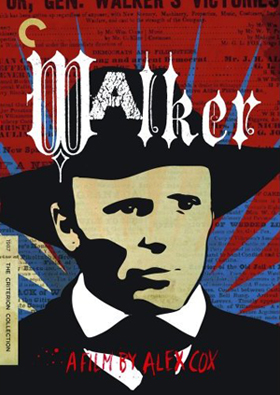Across the Agua to Managua, Nicaragua

Though never far from my thoughts, the Central American nation of Nicaragua, to which I traveled in 1989, does manage occasionally to penetrate the American cultural noise machine--most recently with a reissue of much-lauded photographer Susan Meiselas's monograph, Nicaragua. For me this is an excuse to revel in fond memories of that lovely benighted nation and to note a number of invaluable items that bring Nicaragua out of the shadows of history, recent and long past.
Film director Alex Cox burst onto the cinema scene in the late 1980s with arguably some of the first truly independent films, Repo Man (with Harry Dean Stanton) and Sid and Nancy (with Gary Oldham). He went on to make Walker (with Ed Harris), an inventive and edgy biopic co-written with Rudolph Wurlitzer, about William Walker (no relation to Chuck Norris), one of the first--or at least best-known--American filibusteros. In Cox's film, the brilliant dilettante and dabbler Walker, at the behest of one of the battling political factions, recruits a so-called expeditionary force (mercenaries) to stabilize Nicaragua in the mid 1850s. Of course, when he gets there he assumes dictatorial control of the country. (Watch: "The director dissects the critics.")
Walker's infiltration and tenure adversely affected fellow Tennessean and super-wealthy robber baron Cornelius Vanderbilt's plans--and significant fortune--as Nicaragua was a key element in Vanderbilt's shipping business. (Nicaragua was an early contender for an east-west canal connecting the Atlantic and Pacific Oceans.) Cox's memoir, X Films: True Confessions of a Radical Filmmaker (with enlightening chapters on the making of Walker), reinforces the unflattering image of Hollywood as a nest of vulgarians--except that somehow (and to his credit) Cox has continued to contribute to filmmaking. Happily, there is now available a digitally improved director's cut of Walker. Rewatching the DVD reminded me how much I was mesmerized by Mexican actress Blanca Guerra and the unforgettable soundtrack created by Joe Strummer (a frequent Cox collaborator) in a small farmhouse in Granada, Nicaragua.
Dando-Collins's Tycoon's War: How Cornelius Vanderbilt Invaded a Country to Overthrow America's Most Famous Military Adventurer is a vivid account of yet another sorry interlude in pan-American relations--this time one that entailed a little-remembered war costing thousands of lives and auguring Nicaragua's ongoing role as a playground of American imperialism (which is these days spoken of as "exceptionalism") and the paradigm for the unflattering rubric "banana republic."
Three riveting narratives involving Nicaragua--who would have believed it?
